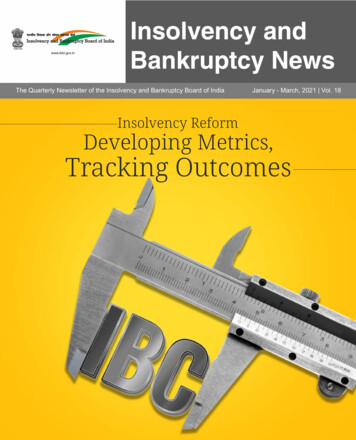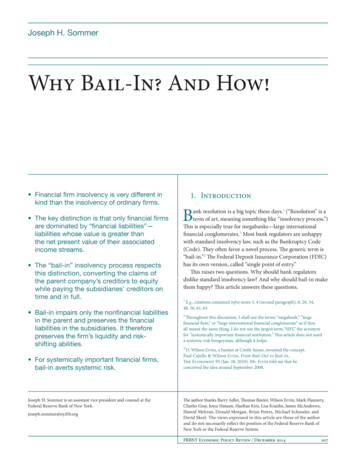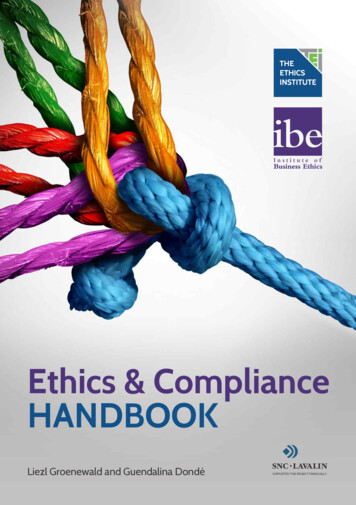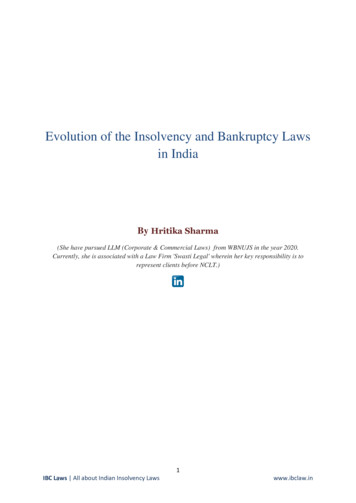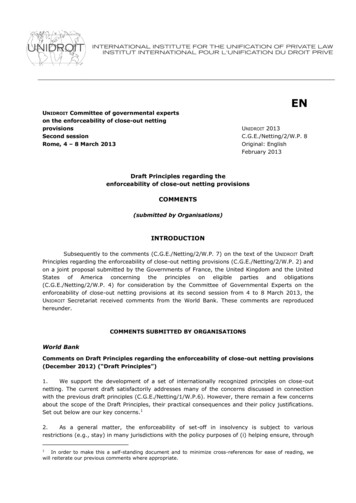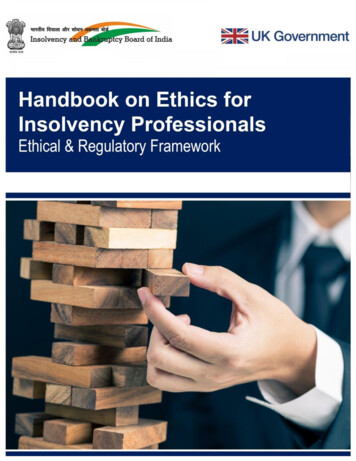
Transcription
Handbook on Ethics for Insolvency ProfessionalEthical and Regulatory Framework1
2
PROLOGUEThe profession of Insolvency Professionals (IPs) has evolved considerably in the short span of 4years since December, 2016 with almost 3,200 IPs as on 30th September 2020 registered withthe Insolvency and Bankruptcy Board of India (“IBBI” / “Board”).An IP is pivotal to the creditor-in-control process and acts as a bridge between the AdjudicatingAuthority, the CoC and other stakeholders. Being vested with the power of board of directors andresponsible for the management of affairs of the corporate debtor, an IP plays a key role in thelifecycle of corporate insolvency resolution process (CIRP).While the powers vested with the IP are necessary to conduct an effective creditor-in-controlbankruptcy process to maximize the enterprise value, it is also essential to administer discretionin the use of such powers to ensure that the CIRP is run in a fair and unbiased manner to protectthe commercial interests of all stakeholders. The strength and efficiency of a bankruptcy regimein India will remain undiluted only if the IPs observe high standards of professional ethics. Aprofession, eventually, is only as good as its members.The Insolvency Professional Agencies (IPAs) under the Insolvency & Bankruptcy Code, 2016(“Code”) are professional bodies mandated to promote the professional development and firsttier regulation of IPs. The IPAs develop professional standards and code of ethics under the Code,audit the functioning of their members, discipline them, and take actions against them, ifnecessary. IPAs are also entrusted with the responsibility to make bye-laws consistent with themodel bye-laws as specified by the IBBI.Currently, the IPs are governed by the Code of Conduct as defined under the IBBI (InsolvencyProfessionals) Regulations, 2016 (“IP Regulations”). All IPs are required to adhere to the Codeand in particular to the spirit of the Code in all their professional activities.The Code of Conduct is generally derived from the Codes of ethics. These ethical norms arebenchmark of right actions at a given point of time which the society or the system expects froman individual and are responsible for strengthening the legal system.3
As far as the IPs are concerned, the code of conduct has been codified in writing and enforcedwith penalties in various countries. The code of ethics aims to help IPs or practitioners meet theirprofessional obligations.In the United Kingdom (UK), the Code of Ethics for insolvency practitioners details how the codeshould be applied in specific circumstances. It lays down five fundamental principles which guidehow IPs should act in the course of their work: IPs should be straightforward and honest in all professional and business relationships(Integrity); IPs should not allow any bias or conflict of interest or any undue influence to cloud theirdecisions (Objectivity); IPs have a duty to attain and maintain professional knowledge and skill based on the latestdevelopments in practice, legislation and techniques (Professional competence and duecare); IPs should respect the confidentiality of the information acquired as a result of professionaland business relationships and not disclose such information to third parties(Confidentiality); IPs should comply with relevant laws and regulations and conduct themselves withcourtesy and consideration when performing their work (Professional behavior).Therefore, the IPs are to work to the highest standards of professionalism, to attain the highestlevels of performance, and at all times comply with the provisions of the Code and regulationsmade thereunder as also terms and conditions specified in the bye-laws of the IPAs of which theyare professional members and take reasonable care and diligence while performing their duties.4
FOREWORDIn the past over four years, since the enactment of the Code, the success of the insolvency andbankruptcy regime hinges, to a large extent, on the quality, commitment, and conduct of theprofessionals associated with the insolvency ecosystem. Despite the fact that the IBC regime iscomparatively new, yet there is a sense of accomplishment in terms of attaining systemic maturityand extraordinary outcomes.As an important stakeholder of the ecosystem, the Insolvency professionals are required tomaintain fine balance between high degree of proficiency and ethical standards. Ethicalstandards largely entail commitment to excellence, preservation of reputation, and requiresstringent compliance to statute without any consideration of undue favours or moralturpitude. The IP is expected to act in good faith in discharge of his dues, with utmost integrity,objectivity, independence, impartiality and should make earnest efforts to maximize the value ofassets of the debtor. An IP needs to ensure that the Corporate Insolvency Resolution Process isrun in a fair and objective manner in the best interest of the stakeholders. Thus, it is of utmostimportance that the IPs maintain high standards of professional ethics, so as to maximise valuefor all stakeholders. The professionals are also expected to maintain the highest standards ofprofessional competence and professional ethics while discharging their duties.It is against this background, that the Insolvency and Bankruptcy Board of India has brought outthis ‘Handbook on Ethics’, to stimulate the highest standards of ethics and professionalism amongthe IPs, together with British High Commission, who facilitated in obtaining inputs on the bestpractices followed by Insolvency Practitioners in UK. The book details several aspects ofprofessional ethics, including conflict of interest, independence, impartiality, objectivity andtimelines in a comprehensive manner, for achieving the highest level of effectiveness, andcompliance with the provisions of the Code in letter as well as spirit. Further, it also containsvarious conceptual and fundamental principles, in line with best practices, emulated by the IPs inthe UK. This Handbook serves as a ready reckoner and a tool to assist the insolvencyprofessionals and all other stakeholders in the insolvency ecosystem, for practising an ethicalcode of conduct.5
I sincerely believe that this Handbook is in line with the ground realities of the Indian InsolvencyEcosystem and would serve as a practical guide for IPs in discharging of their duties ethically andeffectively. It would also aid in development and percolation of standards of professional andethical conduct for IPs and enable proactive compliance with the existing regulatory provisions,with utmost care and diligence, to improve and sustain highest levels of performance.Dr. Navrang SainiWhole Time MemberInsolvency and Bankruptcy Board of India6
CONTENTSOVERVIEW OF THE EXISTING ETHICAL & REGULATORY FRAMEWORK FORINSOLVENCY PROFESSIONALS . 8CODE OF CONDUCT FOR INSOLVENCY PROFESSIONALS . 15INTERPRETATION AND BEST PRACTICES FOR INSOLVENCY PROFESSIONAL . 17INTEGRITY AND OBJECTIVITY . 18INDEPENDENCE & IMPARTIALITY . 29REPRESENTATION OF CORRECT FACTS AND CORRECTING MISAPPREHENSIONS . 37TIMELINES . 44PROFESSIONAL COMPETENCE. 53CONFIDENTIALITY . 71OCCUPATION, EMPLOYABILITY AND RESTRICTIONS . 76REMUNERATION AND COSTS . 90GIFTS AND HOSPITALITY . 102GLOBAL BEST PRACTICES (UK LAWS). 104FUNDAMENTAL PRINCIPLES . 107THE CONCEPTUAL FRAMEWORK . 114ABBREVIATIONS . 124BIBLIOGRAPHY . 125ANNEXURE (Code of Conduct) . 127Note: The paragraphs marked with bookmarkreflect the practice in the United Kingdom.Disclaimer: This Publication is designed for the sole purpose of creating awareness on the subject andmust not be used as a guide for taking or recommending any action or decision, commercial or any legalopinion or otherwise. Every effort has been made to avoid errors or omissions in this publication. A readermust do his own research and / or seek professional advice if he intends to take any action or decision inthe matters covered in this publication.7
OVERVIEW OF THE EXISTING ETHICAL ®ULATORY FRAMEWORK FOR INSOLVENCYPROFESSIONALSOVERVIEW OF THE EXISTING ETHICAL ®ULATORY FRAMEWORK FORINSOLVENCY PROFESSIONALS8
Theprovisions of the Insolvency & Bankruptcy Code lay down an effective ecosystem forimplementation of its provisions which consists of four pillars:a) Adjudicating Authorities (the National Company Law Tribunals), where corporateinsolvency matters shall be heard;b) IBBI, which has regulatory oversight over insolvency professionals and insolvencyprofessional agencies;c) Insolvency Professionals who play a key role in the efficient working of the insolvency andbankruptcy process under the IBC; andd) Information Utilities (IUs) which electronically store facts about lenders and terms oflending and evidence of defaultApart from the above, the Disciplinary Committee set up by the IBBI and the InsolvencyProfessional Agencies also play a crucial role in ensuring that the IPs adhere to ethical standardsand the Code of Conduct.12Adjudicating Authority(NCLT)Insolvency & BankruptcyBoard of IndiaDisciplinary Committee(set up by IBBI)43Information Utilities5Insolvency ProfessionalAgencies5Insolvency ProfessionalsOverview of the Existing Ethical and RegulatoryFramework for Insolvency Professionals9
A. Insolvency and Bankruptcy Board of India (IBBI) The IBBI is a key pillar of the insolvency and bankruptcy institutional infrastructure. It wasenvisioned as the supervisor of the institution of insolvency professionals, as well as otherregulatory entities, for the overall insolvency and bankruptcy process in the country. It is the custodian of the IBC law and is responsible for consolidation and amendment of thelaw, as required, and has regulatory oversight over the Insolvency Professionals, InsolvencyProfessional Agencies, Insolvency Professional Entities, and Information Utilities. It alsoacts as a regulator that writes down the norms by way of regulations for the insolvency andbankruptcy process but does not per se partake in the process. The processes under the Code are private affairs of corporates and individuals. IBBI doesnot get into any financial or strategic businessdecisions of either the persons in distress or theones whose financial exposure is in distress.However, it facilitates smoothIBBI is the key pillar of theinsolvency and bankruptcyinstitutional frameworkconduct andprocesses for the stakeholders by making regulations, within the secondary legislativepowers offered by the Code. By registering the professionals and monitoring theirperformances during the processes, IBBI exercises executive functions. It carries outinvestigation and inspection of the insolvency professionals and professional entities foralleged violations of the law, thereby discharging adjudicatory functions. While discipliningthe professionals who contravene the regulations during the process, IBBI assumes quasijudicial functions as well. Needless to mention that the IP should, at all times, expedite cooperation and timely provision of information as required by the IBBI. The Board largely performs 3 key functions:- Executive: Registering and regulating the service providers for the insolvency processand taking measures for professional development and expertise for the market playersthrough education, examination, training, and continuous professional education.- Quasi-judicial: Adjudication of service providers for ensuring their orderly growth,development, and functioning.- Legislative: Making regulations for market intermediaries (service providers) andprocesses.Overview of the Existing Ethical and RegulatoryFramework for Insolvency Professionals10
B. Insolvency Professional Agencies (IPAs) IPAs are self-regulating professional bodies that focus on developing the profession ofinsolvency professionals. The IBBI has oversight over the functioning of IPAs who in turnregulate the functioning of Insolvency Professionals and monitors their performance underthe IBC1. IPAs carry out functions in furtherance of their powers as prescribed in the IBC,including2:- regulatory functions, such as drafting detailed standards and codes of conduct that aremade public and are binding on all members;- executive functions, such as monitoring, inspecting and investigating members,gathering information on the performance of insolvency professionals;- quasi-judicial functions, such as addressing grievances of aggrieved parties, hearingcomplaints against members and taking suitable actions. The Model Bye-Laws of an IPA require the IPA to continuously improve upon its internalregulations and guidelines to ensure that high standards of professional and ethical conductare maintained by its professional members. It further recommends the IPAs to form anAdvisory Committee of professional members of the IPA to advise the IPA on the mattersrelated to standards of professional and ethical conduct. At present, there are 3 IPAs promoted by the Institute of Chartered Accountants of India,the Institute of Company Secretaries of India, and the Institute of Cost Accountants of Indiarespectively. IPAs develop professional standards and code of ethics under the Code, audit thefunctioning of their members, discipline them and take actions against them if necessary. The Code mandates monitoring of the performance of IPs with respect to legal complianceand empowers IPAs to call for information and records. As part of this, an IP, inter alia, is required to file the following key disclosures with respectto each of his on-going assignments:- Month end disclosures on the status / progress of CIRP (progress reports)- Relationship disclosures (vide IBBI Circular no. No. IP/005/2018) with legal counsel,financial creditors, resolution applicants, valuers, other appointed professionals etc, atvarious milestones of the CIRP12Report of the Bankruptcy Law Reforms Committee Volume I: Rationale and Design, November 2015.IbidOverview of the Existing Ethical and RegulatoryFramework for Insolvency Professionals11
C. Insolvency Professional (IPs) An IP is a person who is enrolled with an IPA as a member and registered with the IBBIafter qualifying Limited Insolvency Examination. Any eligible person having the requiredexperience and qualifications including a chartered accountant, cost accountant, companysecretary, advocate, managerial person can seek registration with an IPA and IBBI aftermeeting the requirements of the regime. The Code has provided for a two-tier regulation of IPs:- The first-tier regulation of IPs is steered by the IPAs who administer the registration ofIPs and promote and supervise their continuous development- The second-tier regulation is steered by the IBBI which maintains a panel of IPs whohave no disciplinary proceedings pending or against them and who hold Authorisationfor Assignment or consented for assignments. This saves judicial time in appointments. Thus, an IP is a crucial pillar responsible for the effective, timely and credible functioning ofthe entire edifice of the insolvency and bankruptcy resolution process. In administering theresolution outcomes, the role of the IP encompasses a wide range of functions, whichinclude adhering to procedure of the law, as well as general management and financerelated functions. The IP is required to adhere to a strict code of conduct while performing his obligationsunder the Code and also ensuring there are adequate procedures and policies laid downand implemented by his team deployed on any ongoing CIRP.D. Information Utilities (IU) The IBC has introduced a new competitive industry ofIUs to provide core services and other services anddischarge such functions as may be necessary forproviding these services. Accordingly, the CodeThere is only 1 IU so farnamely National eGovernance ServicesLtd (NeSL)defined the term core services as services rendered by an IU for; (a) acceptance ofelectronic submission of financial information; (b) safe and accurate recording of financialinformation; (c) authentication and verification of financial information; and (d) providingaccess to information stored with the IU to persons as specified by the IBBI. In addition, aninsolvency professional may submit reports, registers and minutes in respect of anyOverview of the Existing Ethical and RegulatoryFramework for Insolvency Professionals12
insolvency resolution, liquidation or bankruptcy proceedings to an IU for storage, and the IUin turn holds the information as a custodian. Thus, the primary function of IUs is to provide high-quality and authenticated informationabout debts and defaults, potentially making them the backbone of a time-bound andeffective insolvency process. Information available with the utility can be used as evidence in bankruptcy cases beforethe National Company Law Tribunal. Moreover, the database and records maintained bythem would help lenders in taking informed decisions about credit transactions. It wouldalso make debtors cautious as credit information is available with the utility. While Section 215(2) of the Code stipulates that a financial creditor shall submit financialinformation and information relating to assets in relation to which any security interest hasbeen created, Section 215(3) of the Code suggests that operational creditors may alsosubmit financial information to the IU. Vide regulation 38(1) of the IBBI (Information Utilities) Regulations, 2017 an IP may alsosubmit reports, registers and minutes in respect of any insolvency resolution, liquidation orbankruptcy proceedings to an IU for storage. The details of information filed with the National e-Governance Services Limited (NeSL),registered as the first IU by the IBBI, show a growing trend of use of IUs by creditors. In thequarter ending March 2019, 173 financial creditors entered into agreement with NeSL and15,085 were registered as users, up from 108 and 10.247 respectively one quarter earlier.Further, as on September 30, 2020, a total of 1,86,091 loan records have beenauthenticated by debtors. Increased use of IUs is expected to eliminate informationasymmetry and improve implementation timelines under the IBC.E. Disciplinary Committee The conduct of insolvency professionals is overseen by the IBBI. Any person aggrieved bythe functioning of an insolvency professional can file a complaint with the insolvencyregulator. The IBBI, on receipt of a complaint, may cause for an inspection or investigationof the insolvency professional to be conducted within a fixed period of time in accordancewith the Insolvency and Bankruptcy Board of India (Inspection and Investigation)Regulations, 2017 with effect from June 12, 2017. Consequently, a disciplinary committeewill be constituted to consider the results of such an inspection or investigation. If thedisciplinary committee is satisfied that sufficient cause exists, it may impose a penalty on,Overview of the Existing Ethical and RegulatoryFramework for Insolvency Professionals13
or suspend or cancel the registration of, the insolvency professional. The IBBI is alsoempowered to direct any person who has made an unlawful gain or averted loss byindulging in any activity in contravention of the IBC to disgorge an amount equivalent tosuch unlawful gain made or loss averted. IBBI has constituted a Disciplinary Committee to consider and evaluate any contraventionof the Code by IPs, IPAs or IUs. No authority except the disciplinary committee appointedby IBBI is authorised to initiate, hear and dispose of disciplinary proceedings againstprofessionals and professional entities. These committees are constituted under various provisions of the Code and have the powerto impose penalties or suspend or cancel the registration of the IPs/ IPAs/ IUs as the casemay be. The Disciplinary Committee shall act on the basis of the findings of an investigation orinspection conducted by the Investigating Authority. IP is duty bound to provide appropriatedocumentation / information and timely responses to the Show Cause Notices issued bythe Disciplinary Committee with respect to any matter being investigated / inspected.Overview of the Existing Ethical and RegulatoryFramework for Insolvency Professionals14
CODE OF CONDUCT FOR INSOLVENCYPROFESSIONALSCODE OF CONDUCT FOR INSOLVENCYPROFESSIONALS
The First Schedule of the Insolvency and Bankruptcy Board of India (Insolvency Professionals)Regulations, 2016 provides for the Code of Conduct for Insolvency Professionals, as reproducedbelow. The detailed code of conduct has been included as an Annexure to this handbook.Integrity & Objectivity16
INTERPRETATION AND BEST PRACTICES FORINTERPRETATION ANDBEST PRACTICES FORINSOLVENCY PROFESSIONALSINSOLVENCY PROFESSIONALIntegrity & Objectivity17
INTEGRITY AND OBJECTIVITYIntegrityand Objectivity are among the fundamental principles of ethics for InsolvencyProfessionals. As per the First Schedule of the IP Regulations, an IP is required to: Maintain integrity by being honest and straight forward in all professional relationships Not misrepresent facts and refrain from actions that bring disrepute to the profession Be objective in his dealings i.e. decisions be made without conflict of interest, bias, coercion,or undue influence of any party, whether direct or indirect Disclose conflict of interest as soon as he comes to know of it Refrain from himself acquiring, whether directly or indirectly, the assets of the CD orknowingly permit his relatives to do soIntegrity envisages being straightforward and honest in all professional and businessrelationships. It implies fair dealing and truthfulness. The most important attribute of a professionalfor which he is accountable is integrity in character and conduct.Integrity, reputation and character are also pre-requisites for being considered as ‘fit and proper’ forregistration as IP under regulation 4 of the IP Regulations. A profession is only as good as itsmembers. Thus, it is necessary to ensure that a person with clean hands only can enter thisprofession to manage the operation of the CD and conduct the insolvency resolution process.In the matter of rejection of application for registration as an IP on the ground that the applicant isnot a fit and proper person as criminal proceedings were pending against him, the Board observed3:“ What is material is that what others feel about the applicant who has beencharge sheeted for offences such as criminal conspiracy, cheating Does such aperson inspire confidence of the stakeholders who can entrust him with propertyof lakhs of crores for management under corporate insolvency resolution process?Pendency of serious criminal proceedings against the applicant adversely impactshis reputation and makes him not a person fit and proper to become an IP.”3Order dt. 26.02.2018 passed by Whole Time Member of IBBIIntegrity & Objectivity18
A professional's reputation once dented, not onlyimpairs his own ability to render professionalFive Commandmentsservices, but also tarnishes the image of the entireRegulation 7(2) of the IP Regulationsprovides that the registration of an IP issubject to the conditions that the IPshall:profession. Accordingly, while every professionshould have tight entry criteria which allow only 'fitand proper' persons to become its members, it shouldalso have procedures in place to regularly screen itsmembers to determine whether they continue to meetthe 'fit and proper' criteria.An IP should consider himself an ambassador ofthe ecosystem as a whole and perform his dutiestowards his clients, being mindful of his largerresponsibility towards the ecosystem. At no pointshould his individual interests or the interests ofhis clients, or any stakeholder involved be placedA) at all times abide by the code, rules,regulations, and guidelines thereunderand the bye-laws of the IPA with whichhe is enrolled;B) at all times continue to satisfy therequirements under Regulation 4;C) undergo continuing professionaleducation;D) not outsource any of his duties andresponsibilities under the code, exceptthose specifically permitted by IBBI; andE) abide by the code of conduct.above the letter and spirit of the standards andlaws governing the profession.The IPs should not bring disrepute to the profession when undertakingmarketing or promotional activities, ensuring honesty and truthfulness, and shallrefrain from: Charging exaggerated claims for the services offered, or the qualificationsor experience of, the IP; or Disparaging references or unsubstantiated comparisons to the work ofothers. 44Ethics Code for Members issued by the Insolvency Practitioners Association of UK, dated March 2020 (InsolvencyPractitioners Association March 2020)Integrity & Objectivity19
Objectivity requires IP not to compromise professional or business judgements because ofbias, coercion, conflict of interest or undue influence of others, whether directly or indirectly. The IPmust visibly demonstrate his impartiality and lack of bias by: being transparent in all his interactions anddecisions, being collaborative and consultative with allparticipants of the CoC, and ensuring that all decisions are arrived at by activeconsensus and are not bull-dozed by a dominantparticipant or by the IP himself.An IP shall not undertake aprofessional activity if acircumstance orrelationship undulyinfluences the IP’sprofessional judgementregarding that activityAll actions of the office of the IP must speak for- Ethics Code for Members, InsolvencyPractitioners Association of UK, March 2020themselves as being honest, without fear and favour and keeping the best interests of all concerned.This was also aptly captured in the Order of the Disciplinary Committee of IBBI, dated April 17,20195, where the Committee opined that:“When relationship triumphs over merits in professional matters, there is no placefor independence, integrity and impartiality. A professional must not only beimpartial, but also appear to be impartial Any conduct, whether explicitlyprohibited in the law or not, is unfair if it impinges on independence, integrity andimpartiality of an IP or inconsistent with the reputation of the profession.”A conflict of interest creates threats to compliance with the principle of objectivity. An IP shouldnot allow a conflict of interest to compromise his professional or business judgement. Theenvironment in which IPs work and the relationships formed in their professional and personal livescan also lead to threats to the fundamental principle of objectivity. Objectivity may also be threatenedif: any individual within the firm, the close or immediate family of an individual within the firm or the firm itself,has or has had a professional or personal relationship which relates to the insolvency appointmentbeing considered.5IBBI Disciplinary Committee Case No. IBBI/DC/16/2019Integrity & Objectivity20
It is therefore necessary that before accepting an insolvency appointment, an IP takes reasonablesteps to identify circumstances (including any relationships) that might create a conflict of interest,and therefore a threat to compliance with objectivity or other fundamental principles of the Code ofConduct. Such steps shall include identifying: the nature of the relevant interests and relationships between all stakeholders; and the nature, extent and timing of any prior work for the entity or connected entities and itsimplication for all stakeholders.Timely disclosure of any conflict identified above, whether identified prior to appointment or duringthe performance of duties under the appointment to all stakeholders is critical. This might also requireconsent from various stakeholders such as CoC, creditors, etc to continue the appointment.Upon appointment, if the IP realises assets or sells business of the CD shortly after his appointmenton pre-agreed terms, this could also lead to an actual or perceived threat to objectivity. The salecould be seen as a threat to objectivity by creditors or others not involved in the prior agreement. Itis therefore important for the IPs to ensure that their decision-making processes are transparent,understandable and readily identifiable to all third parties who could be affected by a sale orproposed sale.THREAT FOR NON-COMPLIANCEThere are several factors and circumstances that could lead to threat for the IP to uphold his integrityand objectivity. While an exhaustive lis
3 PROLOGUE The profession of Insolvency Professionals (IPs) has evolved considerably in the short span of 4 years since December, 2016 with almost 3,200 IPs as on 30th September 2020 registered with the Insolvency and Bankruptcy Board of India ("IBBI" / "Board").
